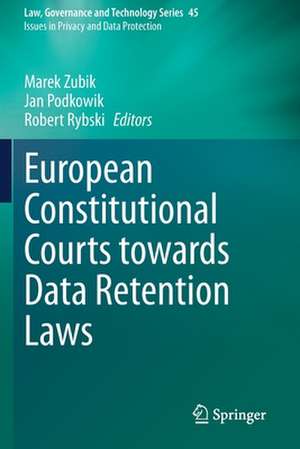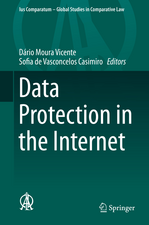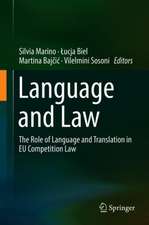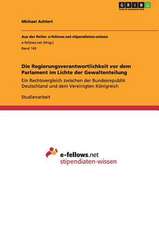European Constitutional Courts towards Data Retention Laws: Law, Governance and Technology Series, cartea 45
Editat de Marek Zubik, Jan Podkowik, Robert Rybskien Limba Engleză Paperback – noi 2021
Moreover, the book discusses whether our current understanding of protection of freedom of communications guaranteed by the constitutions of EU member states and the EU Charter of Fundamental Rights, which was developed in the era of analogue communications, remains accurate in the era of digital technologies and mass surveillance (simultaneously applied by states and private corporations). In this context, the book reconstructs constitutional standards that currently apply in the EU towards data retention.
This book presents a unique comparative analysis of all judgments concerning Directive 2006/24/EC, which can be used in the legislative process on the EU forum aimed at introducing new principles of data retention and by constitutional courts in the context of comparative argumentation.
| Toate formatele și edițiile | Preț | Express |
|---|---|---|
| Paperback (1) | 949.23 lei 6-8 săpt. | |
| Springer International Publishing – noi 2021 | 949.23 lei 6-8 săpt. | |
| Hardback (1) | 955.40 lei 6-8 săpt. | |
| Springer International Publishing – 31 oct 2020 | 955.40 lei 6-8 săpt. |
Din seria Law, Governance and Technology Series
- 18%
 Preț: 950.33 lei
Preț: 950.33 lei - 24%
 Preț: 645.10 lei
Preț: 645.10 lei - 20%
 Preț: 691.09 lei
Preț: 691.09 lei - 20%
 Preț: 574.07 lei
Preț: 574.07 lei - 20%
 Preț: 879.80 lei
Preț: 879.80 lei - 20%
 Preț: 878.75 lei
Preț: 878.75 lei - 15%
 Preț: 720.23 lei
Preț: 720.23 lei - 18%
 Preț: 1122.56 lei
Preț: 1122.56 lei - 18%
 Preț: 1130.27 lei
Preț: 1130.27 lei - 15%
 Preț: 642.83 lei
Preț: 642.83 lei - 18%
 Preț: 950.52 lei
Preț: 950.52 lei - 18%
 Preț: 1009.85 lei
Preț: 1009.85 lei - 18%
 Preț: 1115.14 lei
Preț: 1115.14 lei - 15%
 Preț: 653.14 lei
Preț: 653.14 lei - 18%
 Preț: 1014.76 lei
Preț: 1014.76 lei - 15%
 Preț: 638.43 lei
Preț: 638.43 lei - 18%
 Preț: 1124.30 lei
Preț: 1124.30 lei - 18%
 Preț: 1124.60 lei
Preț: 1124.60 lei - 18%
 Preț: 999.45 lei
Preț: 999.45 lei - 18%
 Preț: 892.42 lei
Preț: 892.42 lei - 15%
 Preț: 640.37 lei
Preț: 640.37 lei - 18%
 Preț: 947.35 lei
Preț: 947.35 lei - 20%
 Preț: 340.32 lei
Preț: 340.32 lei - 18%
 Preț: 1692.20 lei
Preț: 1692.20 lei - 18%
 Preț: 954.93 lei
Preț: 954.93 lei - 24%
 Preț: 789.36 lei
Preț: 789.36 lei -
 Preț: 397.59 lei
Preț: 397.59 lei - 20%
 Preț: 876.57 lei
Preț: 876.57 lei - 20%
 Preț: 652.41 lei
Preț: 652.41 lei - 18%
 Preț: 900.49 lei
Preț: 900.49 lei - 18%
 Preț: 941.50 lei
Preț: 941.50 lei -
 Preț: 392.97 lei
Preț: 392.97 lei
Preț: 949.23 lei
Preț vechi: 1157.60 lei
-18% Nou
Puncte Express: 1424
Preț estimativ în valută:
181.63€ • 190.65$ • 150.76£
181.63€ • 190.65$ • 150.76£
Carte tipărită la comandă
Livrare economică 10-24 aprilie
Preluare comenzi: 021 569.72.76
Specificații
ISBN-13: 9783030571917
ISBN-10: 3030571912
Pagini: 384
Ilustrații: X, 384 p. 1 illus.
Dimensiuni: 155 x 235 mm
Greutate: 0.55 kg
Ediția:1st ed. 2021
Editura: Springer International Publishing
Colecția Springer
Seriile Law, Governance and Technology Series, Issues in Privacy and Data Protection
Locul publicării:Cham, Switzerland
ISBN-10: 3030571912
Pagini: 384
Ilustrații: X, 384 p. 1 illus.
Dimensiuni: 155 x 235 mm
Greutate: 0.55 kg
Ediția:1st ed. 2021
Editura: Springer International Publishing
Colecția Springer
Seriile Law, Governance and Technology Series, Issues in Privacy and Data Protection
Locul publicării:Cham, Switzerland
Cuprins
Data Retention in Europe.- Data Retention in the European Union.- Freedom of Communication and Data Retention in Judgments of the European Court of Human Rights.- Data Retention in Judgments of National Constitutional Courts.- Data Retention in Austria.- Data Retention in Belgium.- Data Retention in Bulgaria.- Data Retention in Cyprus.- Data Retention in Czech Republic.- Data Retention in Germany.- Data Retention in Ireland.- Data Retention in Poland.- Data Retention in Portugal.- Data Retention in Romania.- Data Retention in Slovakia.- Data Retention in Slovenia.- Common European Standard of Data Retention Law in Europe.- Judicial Dialogue on Data Retention Laws Shaping Common European Standard of the Protection of Freedom of Communication in the Digital Age: Concluding Remarks.
Notă biografică
Marek Zubik, Full Professor and Director of the Department of Constitutional Law at the Faculty of Law and Administration of the University of Warsaw; Judge of the Polish Constitutional Tribunal (2010-2019); Principal Investigator of the research project ‘Impact of jurisprudence of European constitutional courts and of the Court of Justice of European Union on forming universal content of freedom of communications in Europe in the era of technological development’ funded by the National Science Centre, Poland (project No. 2015/17/B/HS5/01408); Research interests cover areas of parliamentary law, constitutional fundamentals of public money, functioning of judiciary as well as protection of human rights.
Jan Podkowik, Associate professor at the Department of Constitutional Law at the Faculty of Law and Administration of the University of Warsaw; post-doctoral degree in law (Dr. Habil.); Co-investigator within the research project ‘Impact of jurisprudence of European constitutional courts...’; Research interests cover sources of law, constitutional courts, constitutional fundamentals of civic law as well as constitutional essential of state security.
Robert Rybski, Associate Professor, Department of Constitutional Law at Faculty of Law and Administration of University of Warsaw; graduated from the University of Warsaw (law degree) and Humboldt-Universitaet zu Berlin (LL.M. degree). Research interests cover common grounds of constitutional, environmental and energy law.
Textul de pe ultima copertă
The book analyses the impact the jurisprudence of the constitutional courts of EU Member States and the Court of Justice of the European Union has had on the perception of freedom of communications in the digital era with respect to these courts’ judgments regarding regulating storage and access to telecommunications data (known as telecommunications data retention) from 2008 to 2017. To do so, it examines the jurisprudence of the constitutional courts of Austria, Bulgaria, Cyprus, Czech Republic, Ireland, Germany, Poland, Portugal, Romania, Slovenia, and Slovakia, i.e. those courts that have already ruled on domestic provisions regulating telecommunications data retention. Further, it investigates the judgments of the Court of Justice of European Union regarding directive 2006/24/EC regulating telecommunications data retention along with relevant jurisprudence of the European Court of Human Rights. As such, the book provides a comparative study of jurisprudence and national measures to implement the Data Retention Directive.
Moreover, the book discusses whether our current understanding of protection of freedom of communications guaranteed by the constitutions of EU member states and the EU Charter of Fundamental Rights, which was developed in the era of analogue communications, remains accurate in the era of digital technologies and mass surveillance (simultaneously applied by states and private corporations). In this context, the book reconstructs constitutional standards that currently apply in the EU towards data retention.
This book presents a unique comparative analysis of all judgments concerning Directive 2006/24/EC, which can be used in the legislative process on the EU forum aimed at introducing new principles of data retention and by constitutional courts in the context of comparative argumentation.
Moreover, the book discusses whether our current understanding of protection of freedom of communications guaranteed by the constitutions of EU member states and the EU Charter of Fundamental Rights, which was developed in the era of analogue communications, remains accurate in the era of digital technologies and mass surveillance (simultaneously applied by states and private corporations). In this context, the book reconstructs constitutional standards that currently apply in the EU towards data retention.
This book presents a unique comparative analysis of all judgments concerning Directive 2006/24/EC, which can be used in the legislative process on the EU forum aimed at introducing new principles of data retention and by constitutional courts in the context of comparative argumentation.
Caracteristici
Presents a unique comparative analysis of all judgments of European constitutional courts as well as the ECJ and ECHR in the matter of Data Retention Law Offers an interdisciplinary study of data retention from the perspectives of constitutional law, administrative law, criminal law and private law Reveals the impact of constitutional jurisprudence on our understanding freedom of communications in the digital era




















